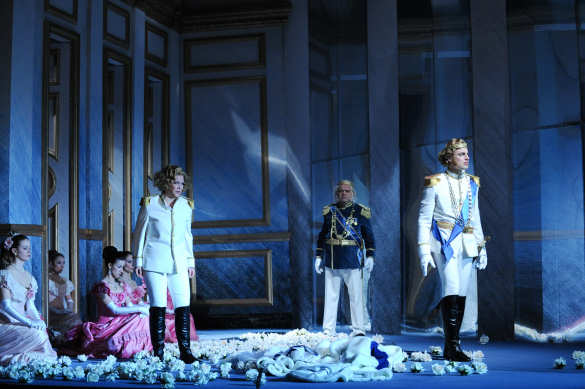Other Links
Editorial Board
-
Editor - Bill Kenny
-
Deputy Editor - Bob Briggs
Founder - Len Mullenger
Google Site Search
SEEN AND HEARD
INTERNATIONAL OPERA REVIEW
Dvořák, Rusalka:
at Greek National
Opera, conductor, Jaroslav Kyzlink 8.3.2009 (BM)

According to the libretto, the nymph Rusalka falls in love with a
mortal prince. To be with him, she sacrifices her immortality and
her voice, but the prince soon tires of her seemingly cold silence.
After she returns to her watery home, he comes there in search of
her and begs her to kiss him and grant him peace, even though he
knows that the touch of her lips will mean his death.
The potentially ‘interesting’ idea and the cause for all the hubbub
was that Wasserman chose to model the prince on the famous
historical figure of Prince Ludwig II of Bavaria and his inner
struggle with his feminine side. Rusalka doesn’t actually exist –
she is his female alter ego. The only trouble was that this drained
all of the heart-rending romance and reflections on the human vs.
the supernatural out of the plot. ‘Cold as ice’ may be a line
frequently repeated by the singers, but what a shame for it to apply
to a production of this extraordinarily passionate opera, so much so
that one was better off just closing one’s eyes, because what we
were being shown on stage seemed to have nothing to do with the
astonishing music floating up from the orchestra pit.
GNO’s orchestra, though challenged, nevertheless rose to the
occasion and managed a truly sophisticated rendition of Dvořák’s
dark-hued score under Czech maestro Jaroslav Kyzlink, and this
effort was not wasted. Nor were those of the superb cast of singers,
featuring Natalia Ushakova as Rusalka, Pavel Černoch as the prince,
- with a glorious voice approaching Heldentenor territory and no
doubt soon to be ‘discovered’ internationally - as well as
Denisa Hamarová as Ježibaba the witch and Yevhen Sholako as Vodník.
What did go to waste, though, were the carefully designed, lovely
period costumes by Bruno Fatalot and the somewhat less impressive
but versatile sets by Thierry Good. All in all, one can certainly
fault the director for crossing the line by deciding to take the
concept of repressed sexuality to extremes and telling a completely
different story, rather than the original one from a new
perspective, but she nonetheless managed to drive home one idea at
the core of this fairy tale, which is that extreme disaster that can
befall us if we deny our nature.
Rusalka was Dvořák’s ninth – and penultimate – opera. For it he
created beautiful melodies portraying the characters and a lushly
textured, stunning orchestration, literally giving the work
everything he had, which in his case was quite a lot. If nothing
else, I am certain that these sounds went straight to the heart of
those hearing them for the first time in Greece, just as they did in
Prague over a century ago. The music casts an inescapable spell,
much like the stuff that fairy tales are made from and the essence
of Rusalka herself. According to the program notes, she represents
the soul of the prince, who needs a fantasy world to make his
everyday life more bearable – and isn’t this exactly why many a
human soul yearns for fairy tales and music?
Bettina Mara
Picture © Stefanos
Back
to Top
Cumulative Index Page
